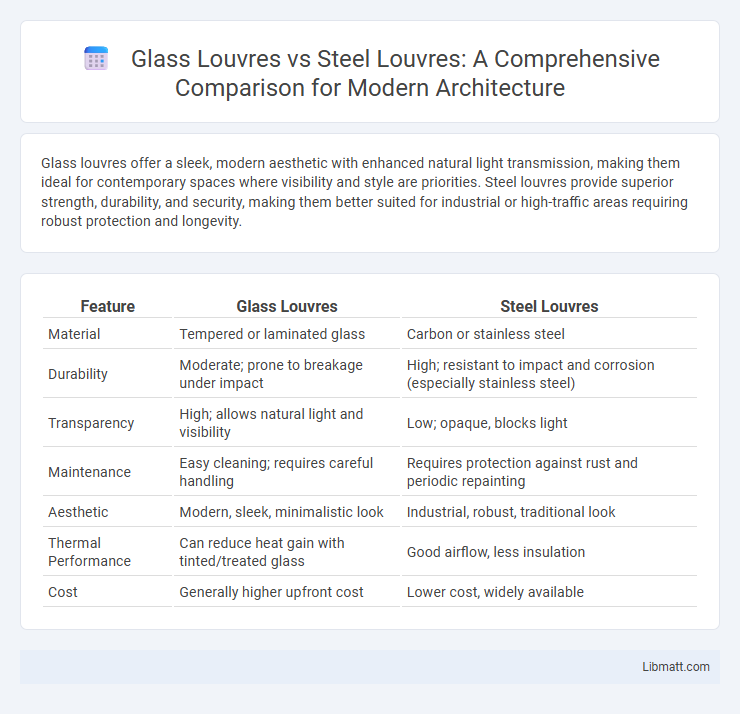Glass louvres offer a sleek, modern aesthetic with enhanced natural light transmission, making them ideal for contemporary spaces where visibility and style are priorities. Steel louvres provide superior strength, durability, and security, making them better suited for industrial or high-traffic areas requiring robust protection and longevity.
Table of Comparison
| Feature | Glass Louvres | Steel Louvres |
|---|---|---|
| Material | Tempered or laminated glass | Carbon or stainless steel |
| Durability | Moderate; prone to breakage under impact | High; resistant to impact and corrosion (especially stainless steel) |
| Transparency | High; allows natural light and visibility | Low; opaque, blocks light |
| Maintenance | Easy cleaning; requires careful handling | Requires protection against rust and periodic repainting |
| Aesthetic | Modern, sleek, minimalistic look | Industrial, robust, traditional look |
| Thermal Performance | Can reduce heat gain with tinted/treated glass | Good airflow, less insulation |
| Cost | Generally higher upfront cost | Lower cost, widely available |
Introduction to Louvres: Function and Importance
Louvres serve as essential components in buildings for controlling airflow, light, and ventilation while providing protection against weather elements. Glass louvres offer transparency and natural light benefits, enhancing aesthetics and energy efficiency in modern architecture. Steel louvres, known for durability and strength, deliver robust performance in harsh environments, making them ideal for industrial and high-security applications tailored to your building's specific needs.
Material Overview: Glass vs Steel Louvres
Glass louvres offer a sleek, modern aesthetic with excellent natural light transmission and corrosion resistance, making them ideal for contemporary architectural designs. Steel louvres provide superior strength and durability, withstanding heavy impact and extreme weather conditions, often favored for industrial or security-focused applications. Your choice depends on balancing the transparency and style of glass against the robustness and longevity of steel louvres.
Aesthetic Appeal and Architectural Impact
Glass louvres offer a sleek, modern aesthetic with their transparency and ability to reflect natural light, enhancing the architectural elegance of contemporary buildings. Steel louvres provide a robust, industrial look, emphasizing durability and structural boldness, often complementing minimalist or utilitarian designs. Your choice between glass and steel louvres will significantly influence the building's visual character and the interplay of light and shadow on its facade.
Durability and Maintenance Requirements
Glass louvres offer excellent corrosion resistance and require minimal maintenance, making them ideal for environments prone to moisture and chemicals. Steel louvres provide superior structural strength and durability but demand regular upkeep to prevent rust and corrosion, especially in outdoor settings. Your choice depends on balancing the low-maintenance benefits of glass with the robust longevity of steel louvres in your specific application.
Ventilation Efficiency and Airflow Control
Glass louvres offer moderate ventilation efficiency with limited airflow control due to their fixed or manually adjustable slats, making them ideal for spaces where natural light and visibility are priorities. Steel louvres provide superior ventilation efficiency and precise airflow control through adjustable blades and robust construction, enhancing indoor air quality and energy management in industrial or commercial settings. When optimizing ventilation performance, your choice between glass and steel louvres should align with specific airflow requirements and environmental conditions.
Energy Efficiency and Thermal Performance
Glass louvres provide superior natural light penetration, reducing reliance on artificial lighting and enhancing overall energy efficiency in buildings. Steel louvres offer excellent durability and thermal resistance, effectively minimizing heat transfer and improving thermal performance in varying climates. Your choice between glass and steel louvres will significantly impact the building's energy consumption and temperature regulation.
Weather Resistance and Longevity
Glass louvres offer superior weather resistance due to their non-corrosive nature and ability to withstand UV exposure without fading or degrading, making them ideal for harsh climates. Steel louvres, while structurally strong, require protective coatings like galvanization or powder coating to prevent rust and corrosion, which can deteriorate over time under prolonged moisture exposure. The longevity of glass louvres generally surpasses steel louvres in outdoor applications, as glass maintains clarity and structural integrity with minimal maintenance compared to steel's susceptibility to oxidation and surface damage.
Security and Safety Considerations
Glass louvres provide limited security due to their fragile nature, making them susceptible to breakage and intrusion, whereas steel louvres offer robust protection against forced entry and impact. In safety terms, steel louvres are fire-resistant and can withstand harsh weather conditions, while glass louvres may shatter under extreme heat or physical stress, posing hazards from broken shards. For your property's security and safety, choosing steel louvres ensures enhanced durability and protection compared to glass alternatives.
Installation Process and Cost Comparison
Glass louvres typically require careful handling and precise alignment during installation, increasing labor time and costs compared to steel louvres, which benefit from simpler, more robust mounting methods. The material cost of glass louvres is generally higher due to specialty glass manufacturing and customization requirements, whereas steel louvres offer a more affordable option with standardized sizes and faster installation. Maintenance expenses also vary, with glass needing frequent cleaning to maintain transparency, while steel louvres require periodic rust prevention treatments but are less fragile overall.
Choosing the Right Louvre: Applications and Recommendations
Glass louvres offer superior natural light transmission and modern aesthetics, making them ideal for residential and commercial spaces where visibility and design are priorities. Steel louvres provide enhanced durability, strength, and security, suitable for industrial settings and areas requiring robust weather resistance. Selecting the right louvre depends on balancing factors such as environmental exposure, maintenance requirements, and functional needs specific to the application.
glass louvres vs steel louvres Infographic

 libmatt.com
libmatt.com